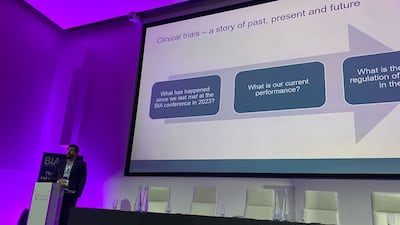
With approval applications for new active substances expected to rise by 25% by 2026, the UK regulator says it wants to focus its national assessment procedure on new innovative therapies. It will also review progress with the new International Recognition Procedure.

The UK’s drug regulator, the MHRA, is exploring new opportunities to work closer with its counterparts from Australia, Canada, Singapore and Switzerland under the ACCESS Consortium group, with a focus on pre-submission scientific advice.

Regulators do not have the resources to “double check” that companies are using AI appropriately, meaning that manufacturers must ensure the AI tools they use meet relevant standards, says an EU regulatory expert.

Some stakeholders say that the entry criteria for the licensing and access pathway have been too broad, leading to an overburdening of the scheme.

Transitional provisions have been put in place to ensure the smooth implementation of new trial rules and requirements in Switzerland.

Updated guidance issued by the EU regulator explains how to comply with the provisions of the amended Variations Regulation, which will apply to new submissions from January 2025 and is intended to make lifecycle management “more efficient and future-proof.”

Up to 40,000 people could be set to access Outlook Therapeutics’ Lytenava in England, according to health technology assessment institute NICE, which found the drug for wet age-related macular degeneration had similar health benefits to aflibercept and ranibizumab, and similar costs to aflibercept.

Teva has been fined €463m – just over half a billion US dollars – over a breach of EU antitrust rules, after the European Commission found that it abused its dominant position to delay competition to Copaxone, including by misusing the patent system and disparaging rivals. The firm has strongly disagreed with the decision – which is claims is “legally untested” and “not supported by the facts” – and says it will appeal.

Companies that delay their drug application submissions to the European Medicines Agency by more than 60 days will face an additional fees of €4,200 per delay under a new regulation effective from 2025.

The European Medicines Agency is conducting a public consultation on proposed revisions to its policy on how it handles any conflicts of interest of its scientific committee members and experts.

The move towards greater regulatory collaboration is a positive step for gene therapy developers, Astellas’ gene therapy strategy lead Richard Wilson says – adding, however, that pharma still needed to understand the Asian markets better.

The European Medicines Agency is monitoring the frequency with which it must re-appoint experts to assess EU drug filings due to companies' failure to submit their applications as scheduled, thereby disrupting the evaluation process. It warns action may be needed if the “situation worsens.”

mHealth data generated by smartphones and wearables show potential for enhancing the clinical evidence used in regulatory decision-making, but there are “notable challenges” that may hinder the use of such data, EU regulators say.

Decision contrasts with successful journey in the US, where it was approved with Fast Track designation in 2023. Astellas says its considering “every potential action” to bring GA drug to patients in Europe.

EU national competent authorities are stressed about having to put up with an “unacceptably high workload” due to poor submission planning by drug companies when it comes to their EU filings. Poor predictability relating to submissions could also impact industry.

The European Medicines Agency should be responsible for the regulatory oversight of AI in the drug development process in the EU and provide clarity on its “risk-based” approach to governance, pharma industry federation EFPIA says.

The European Commission has now adopted the third implementing act for the Health Technology Assessment Regulation. This sets out rules for managing conflicts of interest of anyone involved in joint clinical assessments or joint scientific consultations under the regulation.

The COSIsiFA initiative includes a new independent website, regular newsletters, a six-monthly bulletin, and training courses to help promote the appropriate use of medicines.

Cell and gene therapy manufacturers based in Europe should speak to local regulators to understand how to demonstrate compliance with EU-level good manufacturing practice guidelines, as each country will apply the rules differently, an expert explains.

The deadline for comments is nearing for a draft UK guidance that seeks to increase inclusivity and diversity across clinical trials and investigations.